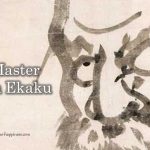
The term Zen, or Chan, means meditation. Zen stories are mostly ancient words and deeds of Zen masters. In Zen Buddhism, enlightenment is not any far-fetched goal to be attained but moment-to-moment awareness and awakening while doing the most mundane tasks in daily life.
Short and humorous, these stories are typically paradoxical, whimsical and at times puzzling. Yet, they never fail to help us reframe our perspective and free us from the distortions of perceptions arising from judgment, beliefs, and attachment. Ultimately, the distinction between good or bad, right or wrong is just a matter of contextual perspective.
Let’s be inspired by the following 10 Zen stories which are as delightful as they are thought-provoking:
Zen Story #1 – A Cup of Tea
Nan-in, a Japanese master during the Meiji era (1868-1912), received a university professor who came to inquire about Zen.
Nan-in served tea. He poured his visitor’s cup full, and then kept on pouring.
The professor watched the overflow until he could no longer restrain himself. “It is overflowing! No more will go in!”
“Like this cup,” Nan-in said, “you are full of your own opinions and speculations. How can I show you Zen unless you first empty your cup?”
Zen Story #2 – Apprentice
A martial arts student went to his teacher and said earnestly: “I am devoted to studying your martial system. How long will it take me to master it?”
The teacher’s reply was casual, “Ten years.” Impatiently, the student answered: “But I want to master it faster than that. I will work very hard. I will practice everyday, ten or more hours a day if I have to. How long will it take then?”
The teacher thought for a moment: “20 years.”
Zen Story #3 – Beautiful Woman
A senior and junior monk were walking down a path together and they arrived at a river with a strong current.
As they prepared to cross the river, they saw a young beautiful woman in need of help to brave the waters. She saw the monks and asked for help.
The senior monk carried the woman on his shoulder and let her gently down on the other bank. They parted ways.
Soon, the junior monk was upset. The senior monk, having noticed the discomfort on the younger monk, asked: “Is something bothering your mind?”
The junior monk said: “As monks we are not permitted to touch a woman, how could you carry her across the river?”
The senior monk replied: “I left the woman hours ago at the bank, however, you seem to still be carrying her.”
Zen Story #4 – New Village
Once, there was a person who relocated to a new village. Wondering if he’d like his new town, he went to consult the Zen master, “Do you think I will like this new village? Are the people nice?”
The Zen master asked: “How were the people in the town where you come from?”
“They were nasty, angry, and greedy. They cheat and steal for a living,” said the newcomer.
“Those are exactly the type of people we have in this village.” said the Zen master.
Another newcomer to the village visited the master and asked the same question. Again, the Zen master asked: “How were the people in the town where you come from?”
“Respectful and caring, they are wonderful people who live in harmony with each other,” He replied.
“Those are exactly the type of people we have in this village.” said the Zen master.
Zen Story #5 – Emptiness
Yamaoka Tesshu, as a young student of Zen, visited one master after another. One day, he called upon Dokuon of Shokoku.
Desiring to show his attainment, he said: “The mind, Buddha, and sentient beings, after all, do not exist. The true nature of phenomena is emptiness. There is no realization, no delusion, no sage, no mediocrity. There is no giving and nothing to be received.”
Dokuon, who was smoking quietly, said nothing.
Suddenly, he whacked Yamaoka with his bamboo pipe. The youth jumped, seething with anger.
“If nothing exists,” inquired Dokuon, “where did this anger come from?”
Zen Story #6 – The Moon Cannot Be Stolen
Ryokan, a Zen master, lived the simplest kind of life in a little hut at the foot of a mountain. One evening a thief visited the hut only to discover there was nothing in it to steal.
Ryokan returned and caught him. “You may have come a long way to visit me,” he told the prowler, “and you should not return empty-handed. Please take my clothes as a gift.”
Bewildered though the thief was, he took the clothes and slunk away.
Ryokan sat naked, watching the moon. “Poor fellow,” he mused, “How I wish I could give him this beautiful moon.”
Zen Story #7 – Moving Mind
Two men were arguing about a flag fluttering in the wind.
“It’s the wind that is really moving,” said the first one. “No, it is the flag that is moving,” contended the second.
A Zen master walked past and overheard the debate. He said, “Neither the flag nor the wind is moving. It is mind that moves.”
Zen Story #8 – It Will Pass
A student went to his meditation teacher and said, “My meditation is horrible! I feel so distracted, or my legs ache, or I’m constantly falling asleep. It’s just horrible!”
“It will pass,” the teacher said matter-of-factly.
A week later, the student came back to his teacher. “My meditation is wonderful! I feel so aware, so peaceful, so alive! It’s just wonderful!’
“It will pass,” the teacher replied matter-of-factly.
Zen Story #9 – Miracle
When Bankei was preaching at Ryumon temple, a Shinshu priest, who believed in salvation through the repetition of the name of the Buddha of Love, was jealous of his large audience and wanted to debate with him.
Bankei was in the midst of a talk when the priest appeared, but the fellow made such a disturbance that Bankei stopped his discourse and asked about the noise.
“The founder of our sect,” boasted the priest, “had such miraculous powers that he held a brush in his hand on one bank of the river, his attendant held up a paper on the other bank, and the teacher wrote the holy name of Amida through the air. Can you do such a wonderful thing?”
Bankei replied lightly: “Perhaps your fox can perform that trick, but that is not the manner of Zen. My miracle is that when I feel hungry I eat, and when I feel thirsty I drink.”
Zen Story #10 – The Thief Who Became a Disciple
One evening, as Shichiri Kojun was reciting sutras, a thief with a sharp sword entered and demanded either his money or his life.
Shichiri told him: “Do not disturb me. You can find the money in that drawer.” Then he resumed his recitation.
A while later, Shichiri said: “Don’t take all the money. I need some to pay taxes tomorrow.”
The intruder gathered up most of the money and started to leave.
“Thank a person when you receive a gift,” Shichiri added.
The thief thanked him and ran away.
A few days later, the thief was caught red-handed. When Shichiri was summoned as a witness he said: “This man is no thief, at least as far as I am concerned. I gave him the money and he thanked me for it.”
After the thief had finished his prison term, he became a disciple of Shichiri.











